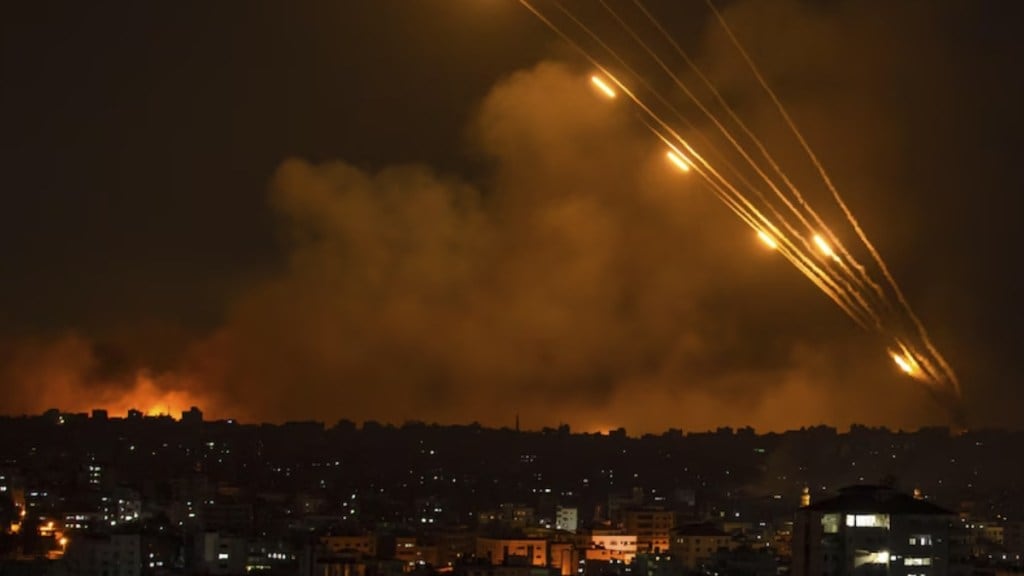Iran executed its first direct attack on Israeli territory by deploying a fleet of explosive drones and launching missiles on Saturday night. This retaliatory strike was prompted by an Israeli assault on an Iranian consulate in Damascus, which claimed the lives of at least 13 individuals, including two prominent figures from Iran’s Revolutionary Guards.
According to the Israeli Defense Force spokesperson, the majority of the incoming missiles were successfully intercepted before breaching Israel’s borders. However, there were reports of injuries and minor infrastructure damage at a military installation in the southern region. Prime Minister Netanyahu of Israel engaged in discussions with President Biden of the United States subsequent to meetings of Israel’s war and security cabinets.
Israel has submitted a request to the UN Security Council urging condemnation of Iran’s assault and the designation of the Revolutionary Guard Corps as a terrorist entity.
Israeli defences thwart major attack; tensions escalate
The attack triggered explosions in Tel Aviv, West Jerusalem and over 720 other locations as Israeli defences engaged Iranian projectiles. Despite the intensity of the assault, Israeli forces intercepted the majority of the over 200 drones, ballistic missiles and cruise missiles launched by Iran, minimising casualties.
One girl was reported wounded, but there were no fatalities. Israel’s Home Front Command lifted the bomb shelter order for its citizens around 00:00 GMT Sunday. Iran’s UN mission declared the consulate raid matter “concluded” but warned of a “considerably more severe” response to future Israeli actions. Following Israel’s request, the UN Security Council scheduled an emergency meeting for Sunday at 4 pm New York time. In response to heightened tensions, Iraq, Jordan, Lebanon, and Israel closed their airspace, leading airlines to suspend regional flights.
Iran, Iraq and Yemen originated attacks; Israeli forces ready for response
Israeli military spokesperson Rear Admiral Daniel Hagari announced in a televised briefing that more than 300 projectiles were launched at Israel overnight, originating from Iran, Iraq, and Yemen. He highlighted that 99% of these were successfully intercepted. He characterised Iran’s actions as significantly exacerbating regional tensions and affirmed the readiness of the Israeli armed forces for potential subsequent operations.
Iran fires 70 more missiles at Israel, US officials report
In response to the latest escalation, Israel’s Prime Minister Benjamin Netanyahu conveyed his country’s readiness for any eventuality, emphasising both defensive capabilities and preparedness for potential offensive actions in a video statement.
Netanyahu’s resolute response to Iran’s aggression
Following Iran’s direct attack with explosive drones and missiles on Saturday night, Israeli Prime Minister Benjamin Netanyahu shared on social media, “We intercepted, we repelled, together we shall win.”
Iran bans zionist regime-linked vessels
In a recent announcement, the Iranian government declared a prohibition on all vessels associated with the Zionist regime from navigating in the Oman Sea and the Persian Gulf. The statement warned of confiscation for any such vessels discovered in these maritime territories.
Biden warns Netanyahu against retaliating to Iran’s assault
President Joe Biden has communicated to Israeli Prime Minister Benjamin Netanyahu the United States’ stance against any form of retaliation towards Iran. Iran’s recent launch of explosive drones and missiles at Israel on Saturday night marks its first direct assault on Israeli territory. The attack was triggered by an Israeli strike on an Iranian consulate in Damascus, resulting in the deaths of at least 13 individuals, including two prominent members of Iran’s Revolutionary Guards as per Reuters.
Canada’s stance on Iran’s aggression
Canada strongly condemns Iran’s aerial assaults on Israel without reservation. Our support for Israel remains steadfast. Following Iran’s endorsement of Hamas’ ruthless attack on October 7, these recent actions by the Iranian regime will only exacerbate regional instability and hinder efforts towards lasting peace.
These assaults once again highlight the Iranian regime’s blatant disregard for peace and stability in the region. We affirm Israel’s right to protect itself and its citizens from such attacks.
I am being regularly briefed by the National Security and Intelligence Advisor, the Chief of the Defence Staff, and the Clerk of the Privy Council as the situation unfolds. We maintain close communication with our allies and will continue to closely monitor developments.
Putin vows support for Iran against potential US-Israeli aggression
In a bold declaration, Russian President Vladimir Putin asserted Russia’s commitment to backing Iran in the event of a US attack on Iranian soil in support of Israel. Putin emphasised the potential repercussions of such conflict, predicting a spike in global commodity prices beginning immediately. Criticising Western support for Israel’s actions against Palestine and Gaza, Putin underscored Russia’s determination to prevent the escalation of tensions that could lead to a catastrophic global conflict.
Saudi Arabia’s foreign minister urges restraint amid military tensions
Expressing profound concern over the escalating military situation in the region, Saudi Arabia’s Foreign Minister emphasised the gravity of its potential repercussions. Issuing a plea for all involved parties to exercise maximum restraint, the Minister underscored the imperative of avoiding war and safeguarding the region and its inhabitants from its perils.


